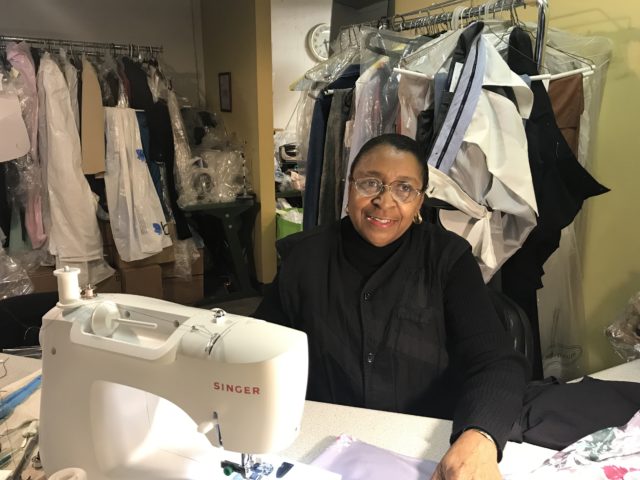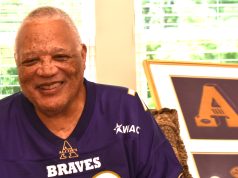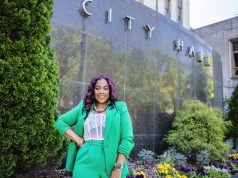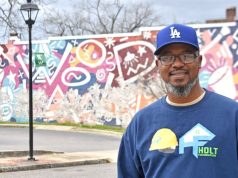By Erica Wright
The Birmingham Times
Sara Maiden traces her beginnings as a seamstress back to when she was 4 years old and made clothes for her paper dolls.
“I started making fronts to paper-doll clothes. They didn’t [need] a back, so it was easy to do,” she said. “Then [my sister and I] started making pillowcases. … I never took classes for sewing. It just was a gift. I was pretty much self-taught all the way.”
Maiden, 71, owner of A1 Expert Reweaving and Alterations in Homewood, has been sewing and perfecting her craft for more than half of her life—and she shows no signs of stopping.
“It’s something I like to do,” she said. “When you do something you already know how to do, it’s just fun to do it for somebody else.”
Maiden specializes in alterations, reweaving, and beading, as well as making clothes, curtains, and pillowcases; she also works with suedes and leathers. She enjoys taking a piece of fabric and turning it into a dress, a pair of pants, or any other article of clothing someone would want to wear.
“That’s what I really liked about sewing from the very beginning. … People need clothes, and everybody has to have something to wear, so you can never go wrong with this type of business. Even if it’s a dying art, it still works.”
Growing Up Birmingham
Maiden grew up downtown Birmingham, near where the Birmingham Jefferson-Convention Complex (BJCC) is currently located.
“There used to be some houses there, and we lived in one of them,” she said. “I actually remember the address: it was 1015 and a half North 19th Street. It was the first [address] I had to learn before I went to … Lincoln Elementary School. … [Our family then] moved to the East Thomas neighborhood on 12th Avenue West. That’s where I really started sewing for other people.”
Maiden—who grew up with her mother, older sister, and brother—was already making clothes for paper dolls, as well as pillows and pillowcases, by the time she and her family moved to East Thomas. Eventually, she and her sister, Patricia, began sewing clothes and making pillowcases for people in their neighborhood.
“People recognized [my skills and said], ‘Well, she can make this as well as Miss Suzy up the street.’ I would make pillows and smocked pillows and smocked throws to go across sofas,” Maiden said. “I made baby clothes and smocked pillowcase edges. We did a little knitting, too. I didn’t get into knitting as much as my sister did, but we were both sewing at the same time.”
Maiden believes she got the gift of sewing from her grandmother, Sara, whom she never met.
“My mom didn’t sew, but her mother did,” Maiden said. “I’m named after [my grandmother], who sewed … for people. My grandmother passed away before I was born, so I regret that I didn’t get to meet her.”
A Sewing Machine
Maiden’s mother, Ada, noticed the sewing proficiency of her daughters, so one Christmas she bought them a sewing machine.
“It was white, and [my sister and I] sewed on that forever. We would take turns, like, ‘Is it your turn or is it my turn?’ The next Christmas, … [our mother] got another machine, so we could sit side-by-side and sew,” Maiden remembered. “A lot of kids probably wanted record players at the time, but [my sister and I] wanted fabrics and sewing machines.”
City Hall
Maiden and her sister developed their sewing skills during the segregation years in Birmingham, and their mother worked at City Hall when the notorious Public Safety Commissioner Eugene “Bull” Connor was in power.
“My mother was a maid, so she cleaned everything and had to deal with a lot of racial issues. We knew about it [and] were taught how to get through it,” Maiden said. “You say, ‘Yes, sir. Yes, ma’am.’ And you keep moving because you’re the child. … If there was a problem, mom was going to handle it.”
Maiden and her sister were able to go to City Hall sometimes with their mother, and they would sew for a lot of people, have fittings in offices that most black people were not allowed to go into unless they were doing housework or making deliveries. Maiden and her sister were able to go because of their mother and because they were so good at sewing and doing alterations.
Maiden sewed for a lot of white people that worked at City Hall, especially after word got out.
“News travels fast when you sew. Somebody would ask, ‘Oh, well, who did that? And can they do that for me?’” said Maiden. “It was kind of ordinary in a way for us because when you’re doing things like that for them, you don’t feel the pinch of segregation as much.”
Prominent Clients
Maiden made dresses for adults for events, such as the annual May Day springtime celebration. She even made her own dress for her sixth-grade Sullivan School graduation. By the time she attended A.H. Parker High School, Maiden was sewing for prominent local business people in Birmingham, including some members of the Pizitz family, owners of the downtown Pizitz Department Store, and “others down there,” she said.
Maiden graduated from A.H. Parker High School in 1967. She lived in Jersey City, N.J., for 15 years and then returned to Birmingham, where she continued to work for dear friends.
“Most of them were people like [Rachel] Arrington, then former Birmingham Mayor Richard Arrington’s wife, who is still a good customer and friend; Mrs. Gaynell Hendricks, owner of the Wee Care Academy downtown; and former Birmingham Mayor Bernard Kincaid’s wife, Alfreda.”
Lots of Changes
Back in Birmingham, Maiden sewed and worked from her home on the city’s west side. In 1991, she opened her Homewood shop and has been at the same location ever since.
Depending on the type of work, a sewing job can take anywhere from a few days to more than a month. If Maiden is making something from scratch, it may take about four to six weeks; a wedding dress or intricate custom work can take longer. Minor alterations take a few days.
Maiden, who has four children and seven grandchildren, said she has seen a lot of changes in the field in her more than 60 years of sewing, but the sewing machine has hardly changed.
“It pretty much stays the same,” she said. “Computerized machines are being sold, and I guess maybe [some people] need all that stuff. I just need a simple machine I can sew on. I have a heavy-duty one that I use every now and then. I have a serger [machine] that I use because it gives a finished stitch. … And I use a blind-stitch machine to [create] pretty hems. If it’s not good enough, then I’ll [sew] by hand.”
Teaching Others
Maiden said it’s a challenge to find people who can sew.
“For about the last 14 years, I’ve been working solo,” she said. “I think it’s a lost art form because the young girls don’t wanna sew. If they prick one of those little fingers, it’s over with. Most people now don’t sew. I might find somebody every now and then, … but it’s just been one of those challenges for me.”
That hasn’t stopped Maiden from teaching others.
“I did classes with one of the doctors [who owns a practice up the street from my shop],” she said. “[He brought about 10 children], and I did classes with them on Saturdays. The boys made swim trunks, and the girls made dresses. They loved it. When that class was over, we would take [the young people] to shop at one of the missions and give back. I did that for [several] summers, and it was a lot of fun.
She also remembers work with her granddaughter’s Girl Scout troop, “and the kids loved it. I donated the fabrics, and their moms would come. … People around here ask me about doing classes with the younger kids, [too], so sometimes I get a long piece of fabric and let them sit at the sewing machine. … They love that,” Maiden said.
A1 Expert Reweaving and Alterations is located in Homewood, at 1812 28th Ave. S., Birmingham, AL 35209; phone: 205-879-0090. The store is open Tuesday through Saturday: 10 a.m. to 4 p.m. Tuesday through Friday; 10 a.m. to noon on Saturday.




